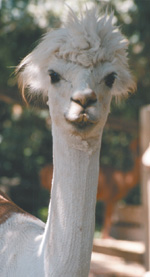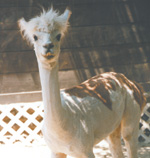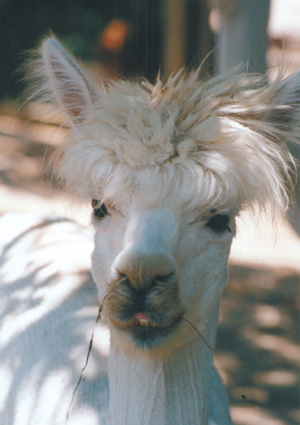| Alpacas | |
| in the Vineyards | |
| By Laurie Davis | |
|
|
They’re fluffy and cute, loaded with personality, and pretty
smart. And yes, they do spit now and then, but mostly at each other.
Alpacas, which originated in the Andes Mountains of South America,
can now be found all over the globe. You’ll even find them
among the vineyards in the wine country, if you visit Alpacas of
Napa Valley. Owner Susan Pacey and her husband Wes Walker, a retired Court
of Appeals judge, grow several hillside acres of Cabernet grapes
for Silver Oak Winery. The rest of the property surrounding their
home is devoted to 17 alpacas, which they own together with her
mother Merle and Merle’s husband, Bob. Together they raise
alpacas for breeding stock, fiber and for fun. Pacey and her mother first encountered an alpaca when they attended
the Black Sheep Gathering in Eugene, Oregon. It was love at first
sight with the exotic, doe-eyed creatures. They purchased their
first alpaca in August of that year. They have continued to work
as partners in the farm, sharing the daily chores and a mutual love
for their animals. They also share a love for spinning and weaving
alpaca wool, and create some of their own pieces using a loom. The alpaca belongs to the camel family. They are considerably
smaller than their most familiar relative, the llama, and possess
a fiber that is prized for its superior quality and warmth (alpaca
fiber is five times warmer than lamb’s wool). The fiber, which
comes in 22 natural colors (from very white to very black, with
all kinds of browns and grays in between), produces a fine weave
that is both supremely soft and durable. Their proud bearing and steady gaze make one pause to consider
just “who” these creatures are beneath all that soft wool.
“Alpacas are very calming animals,” says Pacey, who leads
a busy life on and off the farm. “When you’re around them,
you forget to be stressed.” Pacey refers to her alpacas as “huggable investments.”
Many breeders make a living selling alpacas, in addition to benefiting
from the tax advantages of raising and selling commercial livestock.
The lifestyle, though, seems to be the biggest draw. Alpacas are
more pet than product, and most alpaca owners are pretty passionate
about the breed. “Alpacas are clean, intelligent, safe, quiet and disease-resistant,”
says Pacey. “They have soft-padded feet and are gentle on the
land. They make wonderful companions and great 4-H projects, and
can easily be transported in the family van. They adapt to almost
all climates and do not require large acreage. You can raise 10
to 20 alpacas per acre.”
Pacey’s alpacas are a big hit among the locals, appearing
frequently at the St. Helena Farmers Market held from May through
October. The public is also invited to visit the farm (by appointment),
where you can get up close and personal with alpaca pals like Rubicon,
Fava Bean or Pinot Blanc. Each alpaca is as unique as its name,
different the same way people are different from each other. Some
are overtly friendly and inquisitive, while others may simply prefer
to be left alone. Alpacas are sheared once a year, yielding four to eight pounds
of fiber each. The fiber is then sold to a cooperative and woven
into various items that are shipped back to the United States for
sale. Some of those items make it back to the farm showroom, an
appealing display of wearable art and other products made from alpaca
fiber, including sweaters, vests, caps, socks, handbags, scarves,
shawls, lap throws, and even teddy bears, hand-made baby items,
finger puppets, and jewelry in alpaca motifs. All the wearables
are incredibly soft, and tempting to touch and try on. Alpacas of Napa Valley offers farm tours by appointment. For more information, visit www.alpacasofnapavalley.com or call (707) 257-2226. |




